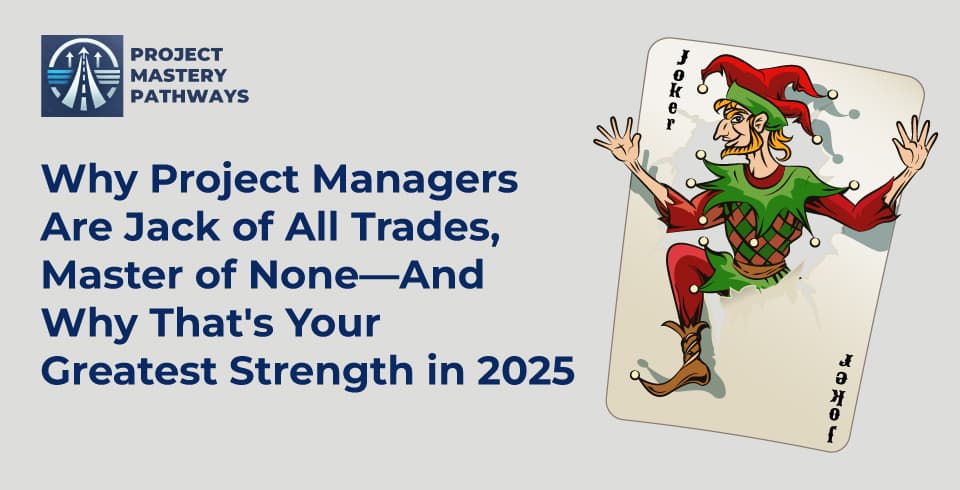“You’re not a real expert in anything, are you?”
If you’ve ever felt the sting of this question as a project manager—or worried that your broad skill set makes you less valuable than specialized professionals—you’re not alone. Many aspiring project managers struggle with imposter syndrome, watching their team members dive deep into specialized domains while they seem to skim the surface of everything. You know a bit about software development, some accounting principles, basic HR practices, and enough about marketing to be dangerous—but you’re not the guru in any single area.
Here’s the liberating truth: being a jack of all trades isn’t a weakness in project management—it’s precisely what makes you irreplaceable. By the end of this blog, you’ll understand why your breadth of knowledge is more valuable than deep specialization, how this generalist approach drives project success, and why organizations desperately need professionals who can see the big picture rather than just one piece of the puzzle.
The Unique Value Proposition of the Generalist Project Manager
Let’s address the elephant in the room: the phrase “jack of all trades, master of none” is often used dismissively, implying superficial knowledge and lack of expertise. However, the complete original saying tells a different story: “A jack of all trades is a master of none, but oftentimes better than a master of one.”
As a project manager, your value doesn’t come from being the best coder, the most creative designer, or the sharpest financial analyst. Your value comes from being the orchestrator who understands enough about each discipline to integrate them effectively toward a common goal.
Consider a construction project. The structural engineer knows everything about load-bearing calculations, the architect understands design aesthetics and functionality, and the electrical contractor is the expert in power systems. But who ensures these specialists work in harmony? Who recognizes that the architect’s beautiful design creates structural challenges, or that the timeline proposed by the contractor conflicts with the procurement schedule? That’s you—the project manager.
Your broad knowledge base allows you to ask the right questions, identify dependencies between different work streams, and translate between specialists who often speak completely different professional languages. When your software developer says “we need to refactor the backend architecture,” you understand enough to know this impacts timeline and budget, even if you can’t write the code yourself.
This generalist perspective is increasingly valuable in 2025’s complex project environments. According to recent industry research, projects fail not because of technical inadequacy in specific domains, but because of poor integration, communication breakdowns, and inability to see cross-functional impacts—all areas where generalist project managers excel.
Why Deep Specialization Would Actually Make You Less Effective
Here’s a counterintuitive truth: if you were a master of one domain, you’d likely be a worse project manager. Let me explain why through a practical scenario.
Imagine you’re managing a digital transformation project, and you happen to be a former software development expert with ten years of coding experience. When your development team proposes an elegant technical solution, your deep expertise might lead you to get pulled into technical debates, optimize code architecture, or spend hours reviewing pull requests.

Sounds helpful, right? Wrong. While you’re deep in the technical weeds, who’s managing stakeholder expectations? Who’s noticing that the marketing team’s requirements weren’t properly communicated to the developers? Who’s identifying that the budget tracking spreadsheet hasn’t been updated in two weeks? Your deep specialization becomes a distraction from your core responsibility—managing the project holistically.
Furthermore, deep expertise in one area often creates unconscious bias. The former developer might prioritize technical perfection over timely delivery. A project manager with a strong financial background might over-emphasize cost control at the expense of quality or innovation. Your generalist nature helps you maintain objectivity and balance competing constraints without favoring one domain over others.
Your role requires you to zoom out when everyone else is zoomed in. While your team members focus intensely on their specialized tasks, you’re monitoring the entire ecosystem—risks, dependencies, stakeholder satisfaction, resource allocation, and strategic alignment. This big-picture perspective is only possible when you’re not anchored to expertise in a single domain.
Think of yourself as a conductor of an orchestra. You don’t need to play the violin better than the first violinist or the trumpet better than the lead trumpeter. You need to understand how all the instruments work together, when each section should come in, and how to create harmony from diverse elements. That’s the essence of project management.
The Critical Skills That Matter More Than Domain Expertise
So if deep technical expertise isn’t your primary value, what skills should you cultivate? Your effectiveness as a project manager rests on a different set of capabilities that are uniquely suited to the generalist mindset.
Communication and translation top the list. Your ability to facilitate understanding between the technical team and business stakeholders, between finance and operations, between vendors and internal teams—this is where you add tremendous value. You become the universal translator who ensures everyone is genuinely aligned, not just using the same words with different meanings.
Systems thinking is your superpower. While specialists optimize their individual components, you see the entire system. You recognize that improving one element might create problems elsewhere. When the procurement team finds a cheaper vendor, you immediately consider quality implications, integration challenges, and potential delays—connections that specialists focused on their own domains might miss.
Adaptive problem-solving becomes crucial when you can’t rely on deep expertise in any single area. You’ve developed the meta-skill of quickly learning enough about unfamiliar domains to make informed decisions. When faced with a blockchain technology component in your project and you know nothing about blockchain, you don’t panic—you know how to ask the right questions, identify reliable resources, and assess risks without becoming a blockchain expert.
Emotional intelligence and stakeholder management matter far more than technical prowess. Your ability to build relationships, navigate organizational politics, motivate diverse team members, and manage conflicts determines project success more than your ability to perform any specialized task. In fact, these soft skills align perfectly with servant leadership principles, where your role is to enable others’ success rather than being the star performer yourself.
Risk identification and mitigation benefit enormously from your generalist perspective. Because you understand multiple domains at a functional level, you can spot risks that specialists might miss. You notice that the legal review timeline conflicts with the marketing launch date, or that the technical architecture decision impacts the change management strategy—connections that require breadth of knowledge rather than depth.
The beauty of developing these skills is that they’re transferable across industries and project types. Whether you’re managing an IT project or a construction initiative, your core project management capabilities remain relevant.
Embracing Your Identity as a Strategic Generalist
It’s time to reframe how you view your role and build confidence in your unique value proposition. You’re not a failed specialist—you’re a strategic generalist, and organizations need you more than ever.
In today’s project environments characterized by cross-functional teams, rapid technological change, and increasing complexity, the ability to integrate diverse elements is more valuable than deep expertise in any single area. Companies can hire specialists for specific tasks, but finding someone who can orchestrate all those specialists toward a common goal while managing constraints and stakeholder expectations? That’s rare and valuable.
Your breadth of knowledge also provides remarkable career resilience. While specialists can find their expertise becoming obsolete as technology and business practices evolve, your meta-skills—communication, integration, risk management, stakeholder engagement—remain perpetually relevant. You can pivot between industries, project types, and methodologies because your core value isn’t tied to specific technical knowledge.
Moreover, as you progress in your career, this generalist foundation becomes increasingly important. Senior project managers and program managers must understand even broader contexts, managing portfolios of diverse projects. Your comfort with breadth over depth positions you perfectly for these leadership trajectories.
Stop apologizing for not being the technical expert in the room. Instead, own your role as the integrator, the translator, the big-picture thinker who ensures all the pieces fit together. When someone questions your expertise in their specific domain, confidently explain that your expertise lies in ensuring their work integrates effectively with everything else, delivers value to stakeholders, and aligns with organizational objectives.
Build your knowledge intentionally. You don’t need to become an expert in every domain, but continuously expand your functional understanding. When you encounter new technologies, methodologies, or business concepts in your projects, invest time in learning enough to ask intelligent questions and identify implications—but resist the temptation to go so deep that you lose your generalist advantage.
Ready to build the well-rounded skill set that makes exceptional project managers? Subscribe to PMPwithRay for insights on developing the diverse capabilities that drive project success across any domain or industry. For comprehensive training that embraces the generalist approach to project management, explore my courses on Udemy, including the PMP Certification Exam 35 PDU Training, which covers the broad knowledge areas essential for effective project leadership, and Project Management Basics for Project Managers, designed to build your foundation as a strategic generalist who can tackle any project with confidence.

